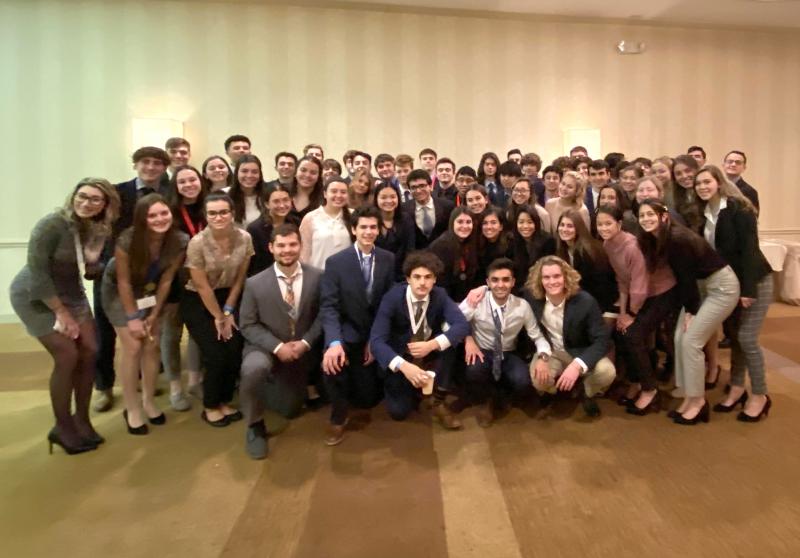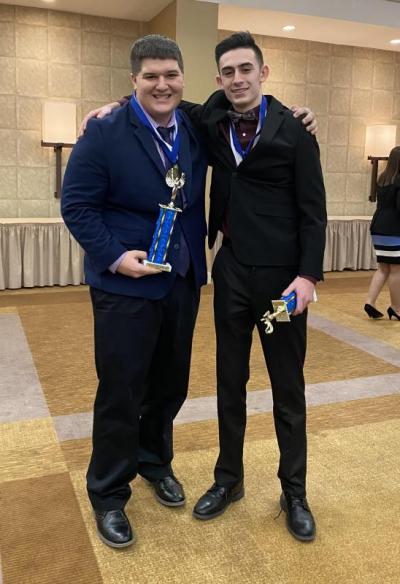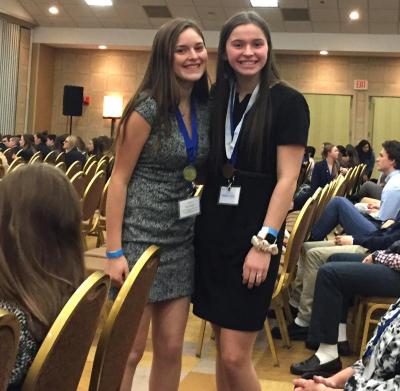Dartmouth High students hone their business skills at DECA competition
Dartmouth High School students are learning how to close major business deals, balance the books of big companies, and solve delicate customer service issues through DECA.
The 70-member after school career readiness club has been a fixture of the high school for nearly two decades. The program challenges students to solve real-world problems in the business, management, marketing, and hospitality industries. Out of school, students compete against other DECA groups locally, nationally, and internationally.
“It helps them to prepare to present themselves in a professional manner, manage their time, think creatively, and solve business problems,” said Patricia Kane, the club’s faculty advisor.
Students participating in the after-school DECA program take business classes during the school day. But those who participate noted what the program really helps with is developing students’ confidence and public speaking skills.
“Most of the business side of the club I’ve learned through my classes here, but in DECA specifically I learn a lot of public speaking through all the role-play practice that we do,” said student Alex Mathes.
From January 9 to 10, 62 Dartmouth High School students attended the district competition in Hyannis, MA. It is the first of three competitions, and 33 students qualified to make it to the next step: A state competition in February.
Each competition is broken into three parts: A 100-question written test, which is taken beforehand, and two role-play scenarios featuring a business problem which will need to be solved. Students, competing as either teams of two or individually, only know that their scenarios will pertain to their field of study, and must come up with a solution which will be judged at the competition.
Club co-president Adam Noseworthy and Mathes competed in the financial services team decision making event. They were tasked with advising a client with $500,000 in savings on investing their money smartly, and advising another hypothetical client on transitioning a hobby to a business.
“She was selling flip-flops, and we had to figure out a way we could either turn it into a business, or decide maybe she should keep it more of a hobby,” Mathes said. “We wanted to make sure that we had all the finances in order, and made sure we thought it was good decision.”
Noseworthy created a full income statement to help guide the process, which helped propel their team to a first place overall finish.
“We had really good planning because [Noseworthy] made the entire income statement,” Mathes said.
DECA’s other co-president, Claire Smith, competed with Sarah Gioiosa in the travel and tourism team event. They helped solve a customer service issue after a passenger aboard a dolphin cruise complained she had not actually seen a dolphin.
When they realized the business’s marketing materiel did guarantee a spotting, they decided to issue a voucher to the customer, and came up with the design for new marketing material avoiding the issue going forward.
“We actually made the tickets out of paper,” Smith said.
The team also developed a marketing plan for a shopping plaza, which was having trouble attracting locals to shop.
“We had to remarket it,” Gioiosa said. “It was a lot of problem solving.”
With districts behind them, the students who qualified for the state competition are now busy practicing and getting ready for it. The competition will be held in Boston from February 27 to 29.

















